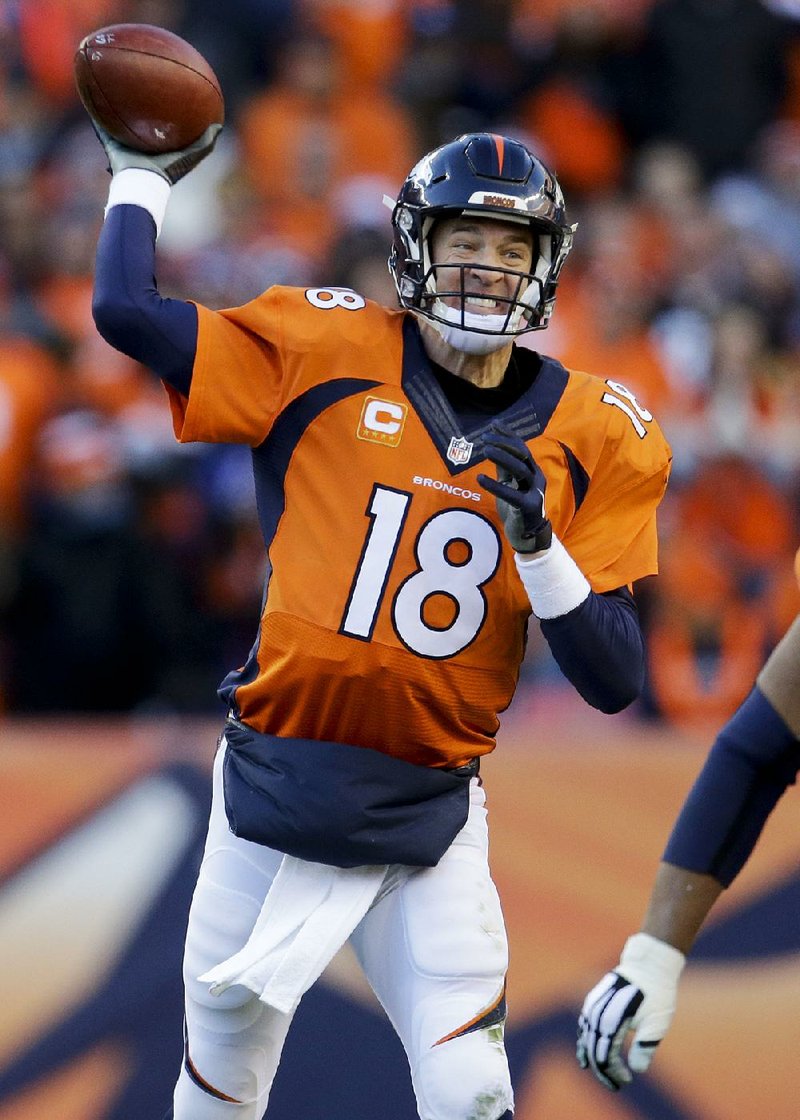FOXBOROUGH, Mass. -- Shortly after Bill Belichick uttered the two words to Tom Brady that would change NFL history -- "You're in." -- the Patriots' locker room was at a psychological crossroads.
There was disappointment that Drew Bledsoe, New England's $100 million quarterback, had suffered a serious injury; frustration that the Patriots were 0-2 and Belichick, in his second season, was said to be on the hot seat; and, perhaps more than anything, doubt.
After that unsuccessful relief appearance in Week 2 of the 2001 season, Belichick named this 24-year-old nobody his starting quarterback, at least for the time being. The kid's opponent in his first NFL start was Peyton Manning, of all people, and the Indianapolis Colts.
"The team was very: 'Wow, what are we going to do now?' " Kevin Faulk, a running back on the 2001 Patriots, said by telephone this week. "For Tom, it was just: manage the team."
Sunday in Denver, Brady and Manning will square off once again, and nearly 15 years since a showdown in September started a rivalry for the ages, this could be its final round. The two legends are pushing 40, and Manning's skills are deteriorating. Fittingly, their 17th meeting -- Brady leads the all-time series, 11-5, but in AFC championship games, Manning has won two of three -- comes with high stakes: a Super Bowl appearance is on the line.
But every closing chapter requires a first. During the third week of the 2001 season, Manning was 25 and in his fourth NFL year, leading a talented offense that, under Coach Jim Mora, hadn't yet found its footing. Brady was, for seemingly inexplicable reasons at the time, confident this was no temporary job.
"I knew eventually this day was going to come," Brady said at the time.
A year earlier, New England drafted him in the sixth round out of Michigan (where he had been a backup) and spent 2000 as the fourth-string passer.
He was maybe the only one with that confidence. Bryan Cox, a linebacker for the Patriots, predicted a natural drop-off from Bledsoe to Brady. Belichick tried to set reasonable expectations.
"I don't think we're talking about John Elway here," the coach told reporters that week.
Out of desperation as much as anything, Brady was Belichick's choice to square off against Manning, but New England was combing the waiver wire for new quarterbacks. The Patriots, according to news reports now forgotten and buried under four Super Bowls' worth of confetti, considered luring Jim Harbaugh out of retirement. They scouted Eric Zeier and Billy Joe Tolliver and Bert Emanuel, and if none of those passers worked out, former Patriots backup Scott Zolak was in their backyard -- selling luxury suites at the yet-unopened facility that would eventually be named Gillette Stadium.
But there was a game to play that Sunday, and Manning-Brady I was set. Belichick and offensive coordinator Charlie Weis devised a plan to take pressure off Brady, who had until then attempted eight NFL passes. The coaching staff turned its attention to confusing Manning, who piloted the league's top-ranked scoring offense.
Willie McGinest, a defensive lineman for the Patriots, recalled Belichick constructing a multilayered defensive attack: pressure up the middle and from Manning's left, moving defenders around to mix up what he had seen during his legendary film sessions, forcing him out of the pocket to disrupt his comfort and timing.
"We always looked at is as us against Peyton as much as people look at Brady versus Peyton," McGinest, now an analyst for the NFL Network, said in an interview. "We always looked at it like that's our challenge."
Brady had made an impression that week by taking ownership of the locker room. He wouldn't earn the full-time starting job until weeks later, but he behaved like a veteran.
"A born leader," Faulk said.
He took command of the huddle and the playbook, and at one point late in the week, Faulk recalled, an offensive lineman stood up and proclaimed Brady as the Patriots' leader, if only for the moment.
On Brady's first play as a starter, he was sacked; three of his first four passes were incomplete. But Belichick settled into his offensive game plan, calling for Brady to hand off to Faulk and Antowain Smith, who ran 4 yards for a touchdown on New England's third drive. Manning played some of his worst football that game in Foxborough. He watched in the second quarter as a receiver bobbled a pass before Patriots corner Otis Smith intercepted the ball and returned it for a touchdown. Manning would throw three picks that day, two of which would be returned for scores.
Brady was hardly great and barely even memorable; he passed for zero touchdowns or interceptions. He completed 13 of 23 passes for 168 yards, but Brady had done his job. The Patriots won, 44-13, sending the Colts toward a 6-10 record in 2001.
"I can just say [it was] a surprise," McGinest said of how Brady handled the moment, "that nobody really ever saw coming."
Afterward, Brady seemed as if he had imagined the scenario again and again.
"This is the team we feel like we are," he said. "We feel we can come out and perform like this and there's no reason why we can't."
New England would go on to win 11 games that year, including its final six contests of the regular season and surprise the St. Louis Rams to win that year's Super Bowl. Brady emerged as an unlikely superstar, and Brady-Manning would become one of football's most compelling rivalries.
Sports on 01/23/2016
